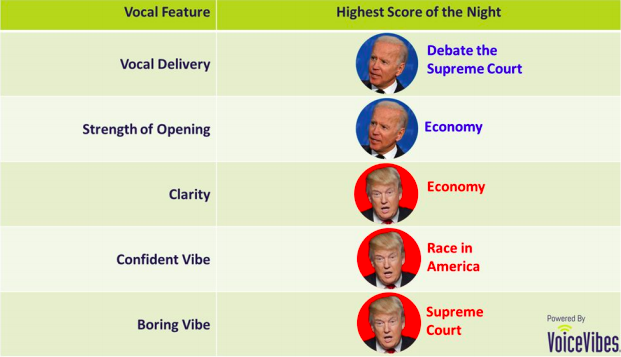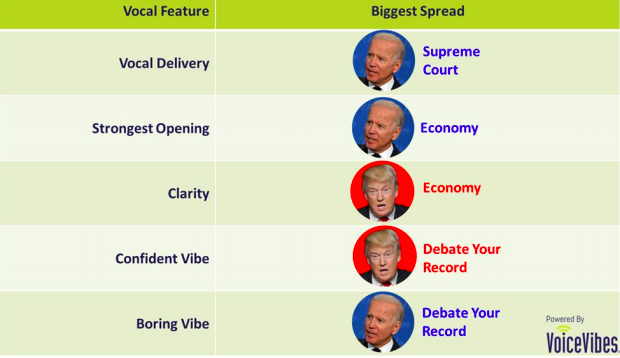Politics is the art of persuasion, so impressions can be just as important as content.
Take presidential debates. While some still long for a pure battle of ideas, the modern age of broadcast pushed debates to become a study in contrast of styles, tones and those ever-intangible leadership qualities as much as policy. It’s why debate analysis can at times seem like theatre criticism — only in this case, the performance has implications for a person’s bid to lead the free world.
It gets at a central truth that goes beyond swing voters.
“How you show up matters, and how you present yourself matters,” said Debra Bond Cancro, founder of Baltimore startup VoiceVibes. “People have opinions of you that are related to the way you sound, not just what you say.”
That’s a mantra for Cancro as she leads the company, which built technology that uses AI and machine learning to analyze the quality of speech, rather than the words. Typically, it turns these tools to help businesses coach employees, where giving positive or negatives vibes can be the difference between getting to yes with clients and customers.
With the presidential debate on Tuesday night, the team decided to turn its tech toward President Donald Trump and former VP Joe Biden. For Cancro, who relishes the chance to dive into the data and has algorithms trained with millions of data points at the ready, it was a prime chance to pull out some insights in a setting where most people have an opinion.
“I think it’s fascinating to get objective data about something that’s so controversial,” the founder said.
While the system couldn’t analyze the moments when both candidates were talking (which Trump instigated a staggering 145 times), Cancro said there were insights to be had from the sections where the candidates were solo at the mic. VoiceVibes analyzed the segments where individual candidates were speaking from the end of the moderator’s question to the first time the other butted in.
VoiceVibes wasn’t looking at what the candidates said, but rather the quality of their speech in clarity, vocal delivery, confidence and the like.
Biden topped Trump in vocal delivery, which essentially measured how professional and polished the candidates sound, on many of the topic categories. Trump, on the other hand, performed better in several categories on persuasiveness. To the surprise of likely no one, this included confidence, where he topped Biden in every category except the economy and the Supreme Court. When he was speaking alone, Cancro was struck that Trump often came across as sounding “comfortable and authentic,” per the analysis.

When it came to the strength of opening, which is the first 30 seconds of a candidate’s statement that can make an impression, Trump was tops in most segments, but Biden scored the highest mark of the night for his response on the economy.
VoiceVibes also looked at when the candidates were boring, and both were pretty dry at times. Trump was more boring in the segments on climate change, the Supreme Court and the economy. Biden, on the other hand, was more boring on race in America and the segment on the candidates’ records.

Overall, Cancro said the analysis gives both candidates high marks, which might be expected from two people who have spent years on TV and speaking in public.
“They’re both effective from our perspective. I think, overall, neither of them are bad. They’re seasoned at speaking and that shows in their data,” she said.
There’s also a measure of redemption to be found in the analysis to be found for moderator Chris Wallace. Though he acknowledged he was “sad” the way the debate turned out, he topped both candidates in the vocal delivery category for each segment, except for the Supreme Court. Some just wished he would’ve used that effective style a bit more often.







